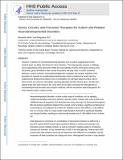| dc.contributor.author | Sahin, Mustafa | |
| dc.contributor.author | Sur, Mriganka | |
| dc.date.accessioned | 2016-07-20T14:14:38Z | |
| dc.date.available | 2016-07-20T14:14:38Z | |
| dc.date.issued | 2016-07-20 | |
| dc.identifier.issn | 0036-8075 | |
| dc.identifier.issn | 1095-9203 | |
| dc.identifier.uri | http://hdl.handle.net/1721.1/103768 | |
| dc.description.abstract | Research in the genetics of neurodevelopmental disorders such as autism suggests that several hundred genes are likely risk factors for these disorders. This heterogeneity presents a challenge and an opportunity at the same time. Although the exact identity of many of the genes remains to be discovered, genes identified to date encode proteins that play roles in certain conserved pathways: protein synthesis, transcriptional and epigenetic regulation, and synaptic signaling. The next generation of research in neurodevelopmental disorders must address the neural circuitry underlying the behavioral symptoms and comorbidities, the cell types playing critical roles in these circuits, and common intercellular signaling pathways that link diverse genes. Results from clinical trials have been mixed so far. Only when we can leverage the heterogeneity of neurodevelopmental disorders into precision medicine will the mechanism-based therapeutics for these disorders start to unlock success. | en_US |
| dc.description.sponsorship | National Institutes of Health (U.S.) (NIH grant MH085802) | en_US |
| dc.description.sponsorship | Simons Foundation (Autism Research Initiative) | en_US |
| dc.description.sponsorship | National Institutes of Health (U.S.) (NIH grant U01 NS082320) | en_US |
| dc.description.sponsorship | National Institutes of Health (U.S.) (NIH grant P20 NS080199) | en_US |
| dc.description.sponsorship | National Institutes of Health (U.S.) (NIH grant P30 HD018655) | en_US |
| dc.description.sponsorship | National Institutes of Health (U.S.) (NIH grant EY007023) | en_US |
| dc.description.sponsorship | United States. Dept. of Defense (W81XWH-13-1-0040) | en_US |
| dc.description.sponsorship | United States. Dept. of Defense (W81XWH-15-1-0189) | en_US |
| dc.description.sponsorship | Simons Foundation | en_US |
| dc.description.sponsorship | Nancy Lurie Marks Family Foundation | en_US |
| dc.description.sponsorship | Boston Children's Hospital (Translational Research Program) | en_US |
| dc.description.sponsorship | Autism Speaks (Organization) | en_US |
| dc.description.sponsorship | Tuberous Sclerosis Alliance | en_US |
| dc.description.sponsorship | National Institutes of Health (U.S.). Office of Rare Diseases Research (Developmental Synaptopathies Consortium (U54NS092090)) | en_US |
| dc.language.iso | en_US | |
| dc.publisher | American Association for the Advancement of Science (AAAS) | en_US |
| dc.relation.isversionof | http://dx.doi.org/10.1126/science.aab3897 | en_US |
| dc.rights | Creative Commons Attribution-Noncommercial-Share Alike | en_US |
| dc.rights.uri | http://creativecommons.org/licenses/by-nc-sa/4.0/ | en_US |
| dc.source | PMC | en_US |
| dc.title | Genes, circuits, and precision therapies for autism and related neurodevelopmental disorders | en_US |
| dc.type | Article | en_US |
| dc.identifier.citation | Sahin, Mustafa, and Mriganka Sur. “Genes, Circuits, and Precision Therapies for Autism and Related Neurodevelopmental Disorders.” Science 350, no. 6263 (October 15, 2015): aab3897–aab3897. | en_US |
| dc.contributor.department | Massachusetts Institute of Technology. Department of Brain and Cognitive Sciences | en_US |
| dc.contributor.department | Picower Institute for Learning and Memory | en_US |
| dc.contributor.mitauthor | Sur, Mriganka | en_US |
| dc.relation.journal | Science | en_US |
| dc.eprint.version | Author's final manuscript | en_US |
| dc.type.uri | http://purl.org/eprint/type/JournalArticle | en_US |
| eprint.status | http://purl.org/eprint/status/PeerReviewed | en_US |
| dspace.orderedauthors | Sahin, M.; Sur, M. | en_US |
| dspace.embargo.terms | N | en_US |
| dc.identifier.orcid | https://orcid.org/0000-0003-2442-5671 | |
| mit.license | OPEN_ACCESS_POLICY | en_US |
